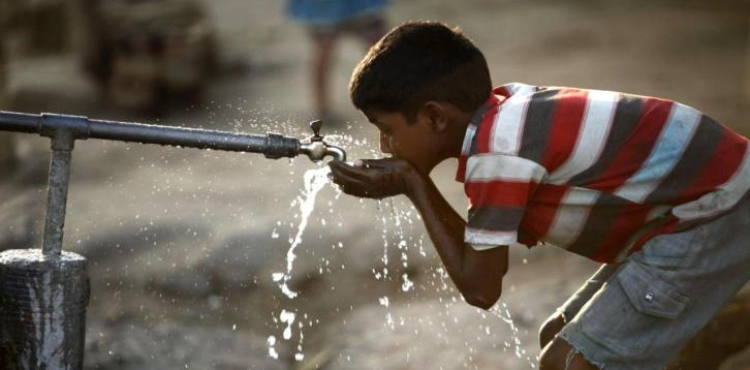More than 30 Palestinian communities remain without access to water and rely on primitive and unsafe ways of providing their drinking water in parallel with the disastrous water situation in Gaza, the head of the Palestinian Water Authority said on Tuesday.
He pointed to the repercussions of the serious economic and political conditions on the water sector, the first of which is the complete cessation of US support for projects and programs of the water and sanitation sector.According to the preliminary statistics of the existing projects, there are six projects on the ground that have been completely stopped due to the suspension of US support, estimated at about $ 20 million.
Ghoneim opened the regular meeting of the water sector working group, which includes international donors, UN organizations, member ministries and civil society partners.
The meeting comes within the framework of the Water Authority´s efforts to cooperate and communicate with all partners and put them in the latest developments in the water sector, in addition to presenting challenges to projects and programs, in accordance with the principle of partnership and transparency pursued by the Water Authority
He pointed out that under the occupation´s plans to expand, displace and uproot the Palestinians, which have not ended, the pace of escalation of the occupation has escalated for its daily violations. For the same purpose, the US government stopped its support, which increased the burdens of the government in the face of this attack and clamped down on the development of services for citizens, and hampered institutional work, and extended all aspects of life for our people.
He stressed that the water file is one of the most affected sectors, especially as it is politically still the occupation dominates the groundwater basins and water sources, putting obstacles to the implementation of water and sanitation projects, pointing out that we extract the pressure of the international community to approve the implementation of some water projects because of what we are exposed to From extortion and bargaining to obtain approvals, whether in the Joint Committee or the occupation authorities.
In the sewage sector, the President of the Water Authority explained that the occupation obstructs projects and deducts from the clearance instead of treating transboundary water that increases annually without providing the Palestinian government with detailed bills on quantities, prices and treatment areas. The cuts amounted to NIS 115 million and reached NIS 75 million until July of this year, stressing that the Water Authority is proceeding with the treatment plants projects, which have become a reality on the ground. The actual construction of the plant was commenced in parallel with the technical capacity of the Hebron Municipality Water Department.
Ghoneim pointed out that despite the ongoing plans and projects and the commitment to the development of the sewage sector, there is still a problem related to the commitment of local authorities to pay full fees for domestic connections, which amount to 1000 euros per link, which required to look for funding for these aspects, to ensure the projects work efficiently .
He added that despite the great efforts exerted by the Water Authority and its partners, and with the focus of the donors on the implementation of projects in the Gaza Strip, which has resulted in programs and projects that have contributed effectively to improving water and sanitation services, but under the current economic conditions need to provide the necessary funding To cover the cost of operation and maintenance, especially the cost of energy, which makes up about 50% of this cost.
Ghoneim called on partners and supporters to increase their support to cover this cost to ensure the sustainability of these facilities and maintain, pointing out that the Water Authority is currently evaluating mechanisms to achieve financial sustainability in Gaza by service providers to manage and activate water facilities in efficient ways in the coming years.
Ghoneim briefed the partners on the development of the Central Desalination Plant program, which the PWA managed to secure approximately € 487 million during the 2018 Donors´ Conference and the last Brussels meeting in April this year, leaving the remaining deficit at € 85 million, noting that there were pledges from the EU. European Union to cover any financial deficit in the implementation of the project.
For his part, Prime Minister Advisor Stefan Salama assured the Prime Minister´s follow-up and interest in the water file and issues arising from it, and his support for all the work and programs that are being worked out by all parties in coordination and follow-up with the Water Authority, the official body responsible for this facility, which faces daily challenges On top of which is the occupation.
Salameh added that the water sector is witnessing the completion of many projects and development plans in both the West Bank and Gaza. There is intensive work being done to ensure the fulfillment of our commitment to the Gaza Strip to provide potable water and this is reinforced by ensuring that all parties abide by their commitments to the strategic project. To avoid any problems or challenges you may face the listed business.
The attendees were briefed by the PWA specialists on the most important developments in the issues of water resources, the quantities of water and the mechanism of work to increase it and meet the daily needs, the outstanding issues with the Israeli side, and the denial of Palestinians to find new sources while Israel is separately building wells and benefit from quantities. Extra water.












